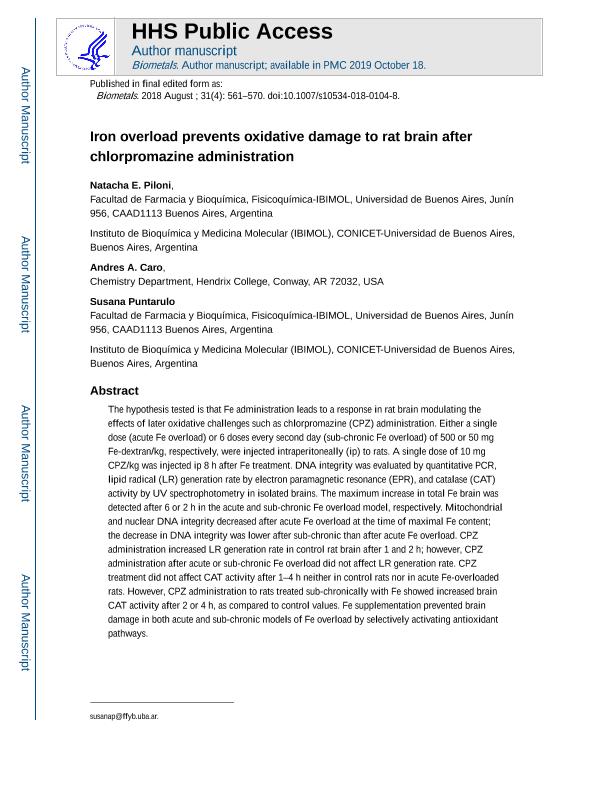Artículo
Iron overload prevents oxidative damage to rat brain after chlorpromazine administration
Fecha de publicación:
08/2018
Editorial:
Springer
Revista:
Biometals
ISSN:
0966-0844
Idioma:
Inglés
Tipo de recurso:
Artículo publicado
Clasificación temática:
Resumen
The hypothesis tested is that Fe administration leads to a response in rat brain modulating the effects of later oxidative challenges such as chlorpromazine (CPZ) administration. Either a single dose (acute Fe overload) or 6 doses every second day (sub-chronic Fe overload) of 500 or 50 mg Fe-dextran/kg, respectively, were injected intraperitoneally (ip) to rats. A single dose of 10 mg CPZ/kg was injected ip 8 h after Fe treatment. DNA integrity was evaluated by quantitative PCR, lipid radical (LR · ) generation rate by electron paramagnetic resonance (EPR), and catalase (CAT) activity by UV spectrophotometry in isolated brains. The maximum increase in total Fe brain was detected after 6 or 2 h in the acute and sub-chronic Fe overload model, respectively. Mitochondrial and nuclear DNA integrity decreased after acute Fe overload at the time of maximal Fe content; the decrease in DNA integrity was lower after sub-chronic than after acute Fe overload. CPZ administration increased LR · generation rate in control rat brain after 1 and 2 h; however, CPZ administration after acute or sub-chronic Fe overload did not affect LR · generation rate. CPZ treatment did not affect CAT activity after 1–4 h neither in control rats nor in acute Fe-overloaded rats. However, CPZ administration to rats treated sub-chronically with Fe showed increased brain CAT activity after 2 or 4 h, as compared to control values. Fe supplementation prevented brain damage in both acute and sub-chronic models of Fe overload by selectively activating antioxidant pathways.
Archivos asociados
Licencia
Identificadores
Colecciones
Articulos(IBIMOL)
Articulos de INSTITUTO DE BIOQUIMICA Y MEDICINA MOLECULAR
Articulos de INSTITUTO DE BIOQUIMICA Y MEDICINA MOLECULAR
Citación
Piloni, Natacha Estefanía; Caro, Andres A.; Puntarulo, Susana Ángela; Iron overload prevents oxidative damage to rat brain after chlorpromazine administration; Springer; Biometals; 31; 4; 8-2018; 561-570
Compartir
Altmétricas




